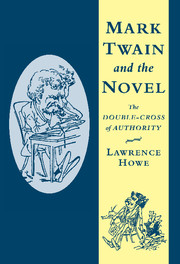Book contents
- Frontmatter
- Contents
- Acknowledgments
- List of abbreviations
- Introduction: Bearing the Double-Cross
- 1 Mark Twain's Big Two-Hearted River Text: “Old Times on the Mississippi” and Life on the Mississippi
- 2 Catching Mark Twain's Drift: The Adventures of Tom Sawyer and Adventures of Huckleberry Finn
- 3 Reinventing and Circumventing History: The Prince and the Pauper and A Connecticut Yankee in King Arthur's Court
- 4 Twaining Is Everything: The American Claimant and Pudd'nhead Wilson
- Epilogue: After the Double-Cross
- Notes
- Index
1 - Mark Twain's Big Two-Hearted River Text: “Old Times on the Mississippi” and Life on the Mississippi
Published online by Cambridge University Press: 05 September 2012
- Frontmatter
- Contents
- Acknowledgments
- List of abbreviations
- Introduction: Bearing the Double-Cross
- 1 Mark Twain's Big Two-Hearted River Text: “Old Times on the Mississippi” and Life on the Mississippi
- 2 Catching Mark Twain's Drift: The Adventures of Tom Sawyer and Adventures of Huckleberry Finn
- 3 Reinventing and Circumventing History: The Prince and the Pauper and A Connecticut Yankee in King Arthur's Court
- 4 Twaining Is Everything: The American Claimant and Pudd'nhead Wilson
- Epilogue: After the Double-Cross
- Notes
- Index
Summary
One chooses dialectic only when one has no other means. One knows that one arouses mistrust with it. Nothing is easier to erase than a dialectical effect… It can only be self-defense for those who no longer have other weapons.
– Friedrich Nietzsche, Twilight of the IdolsDespite the ring of truth in Ernest Hemingway's often-cited praise of Adventures of Huckleberry Finn, he was wrong to insist that “There was nothing before” it. For Mark Twain, there was Life on the Mississippi before there was Huckleberry Finn. What's more, Life on the Mississippi is not simply the antecedent of Twain's most recognized book; it is also some of his most personal writing, an ambitious experiment in which he worked out his complex attitude about the authority he assumed as a writer. The Mississippi book is thus an indispensable landmark for mapping Twain's distrust of and desire for authority.
Corresponding to his divided attitude toward authority, Life on the Mississippi is a divided text. In part 1, Twain recycled “Old Times on the Mississippi” – the sketches of his life as a cub pilot originally published as seven installments in the Atlantic Monthly in 1875 – dividing the seven into fourteen chapters and framing them with six new chapters equally apportioned before and after the “Old Times” material. To this he joined the travel narrative of his 1882 riverboat journey down and up the Mississippi, after he had become a writer, which forms part 2 of the book.
- Type
- Chapter
- Information
- Mark Twain and the NovelThe Double-Cross of Authority, pp. 14 - 72Publisher: Cambridge University PressPrint publication year: 1998



